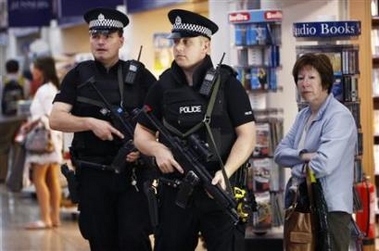Latest Development
3 doctors among arrested in British plot
(AP)
Updated: 2007-07-03 08:32
 |
Large Medium Small |
LONDON - At least three physicians were identified Monday among suspects arrested in Britain's failed car bomb attacks, and authorities announced three new arrests - including a doctor in Australia - as the investigation spread overseas.
 Armed police officers patrol Glasgow Airport in Scotland July 2, 2007. [Reuters]  |
Officers used heightened stop-and-search powers and armed response vehicles to hunt for anyone else who might have been involved in the plot, and police put on a show of force to bolster security at airports and train stations and on city streets.
Hours after police announced the arrests of two more people in the Glasgow area, officials said an eighth suspect was detained "abroad by local authorities" Monday.
Australian authorities later said he was arrested at the airport in Brisbane while trying to leave the country. Queensland state Premier Peter Beattie described the suspect as a 27-year-old man but withheld his identity. Australian Attorney General Philip Ruddock said the suspect was a doctor at a Queensland state hospital but was not a citizen.
A British security official said earlier in the day that Pakistan and several other nations were asked to check possible links with the suspects. British-born terrorists behind the bloody 2005 London transit bombings and others in thwarted plots here were linked to terror training camps and foreign radicals in Pakistan.
"We have asked partners overseas to check possible links and that work has begun," the security official said, adding that it was still possible some British-born people were involved in the plot.
Authorities said police searched at least 19 locations as part of the "fast-moving investigation," which has come at a time of already high vigilance before the anniversary of the suicide bombings in London that killed 52 people on July 7, 2005.
Prime Minister Gordon Brown, who has said the group behind the weekend attacks was "associated with al-Qaida," got a call from President Bush commending him for Britain's response.
"President Bush concluded by reiterating that the United States is prepared to offer any assistance desired, and noted the importance of continued cooperation," said Gordon Johndroe, spokesman for the White House's National Security Council.
Two US counterterrorism officials, who agreed to discuss the case only if not quoted by name, said the attackers in Britain were Islamic extremists sympathetic to al-Qaida, but investigators were still trying to figure out whether there were any direct links.
One of the officials also said there continued to be concerns about possible plots to attack the United States, including the potential for a large-scale assault by al-Qaida. Among the factors contributing to the worry are al-Qaida's efforts to recruit in Pakistan's tribal areas and its increased flow of public messages, the official said.
In the latest attacks, two car bombs failed to explode in central London on Friday and two men rammed a Jeep Cherokee loaded with gas cylinders into the entrance of Glasgow International Airport and then set it on fire Saturday.
The British government security official said investigators were working on one theory that the same people may have driven the explosives-laden cars into London and the blazing SUV in Glasgow.
The unidentified driver of the Jeep was being treated for serious burns at Royal Alexandra Hospital in Glasgow, where he was under arrest by armed police. Bomb experts carried out a second controlled explosion on a car at the hospital Monday, after a similar blast Sunday. Police said the car was linked to the investigation, but no explosives had been found.
Police announced Monday that they arrested two men the previous day at residences at the hospital, but would not say whether they were doctors. Britain's Sky Television described them as trainee physicians, without citing a source for its report.
Four men and a woman were detained earlier.
Authorities identified Bilal Abdulla, an Iraqi doctor who worked at the Glasgow hospital, was the other man arrested at the airport and said he was being held at a high-security police station in Glasgow.
According to the British General Medical Council's register, a man named Bilal Talal Abdul Samad Abdulla was registered in 2004 and trained in Baghdad. Staff at the Glasgow hospital said Abdulla was a diabetes specialist.
A man arrested late Saturday on a highway in central England was also a physician, Mohammed Jamil Abdelqader Asha, police said. A Jordanian official said Asha was of Palestinian descent and carried a Jordanian passport.
Britain's The Independent and The Muslim News newspapers reported that a man arrested in Liverpool late Saturday was a 26-year-old doctor from Bangalore, India, who worked at Halton Hospital in Cheshire, northern England. Police would not immediately comment on the reports.
The Muslim News also said the Indian doctor had used the car, cell phone and Internet account of a fellow physician who had moved from England to Australia around a year ago. It said police had asked friends of the Indian for details about the man who went to Australia.
"This case could be the final proof that an idea those involved in these type of attacks are all young, angry and poorly educated is a mistake," said Paul Cornish, a former British army officer and director of defense studies at London's Chatham House think tank.
"It's wrong to suggest al-Qaida are ignorant hill men. They are often middle or upper class and well educated," Cornish said.
Former US intelligence officer Bob Ayers, now a security analyst based in London, said wealth or intelligence matters little to people committed to extremism.
"We shouldn't be surprised that educated men are as involved as poor youngsters," he said. "They all subscribe to the same radical ideology, that's the only criteria they need to fill."
Salil Vengalil, a doctor at North Staffordshire Hospital, near the Midlands town of Newcastle-under-Lyme, said Asha worked in the neurology department at that hospital.
| 分享按钮 |